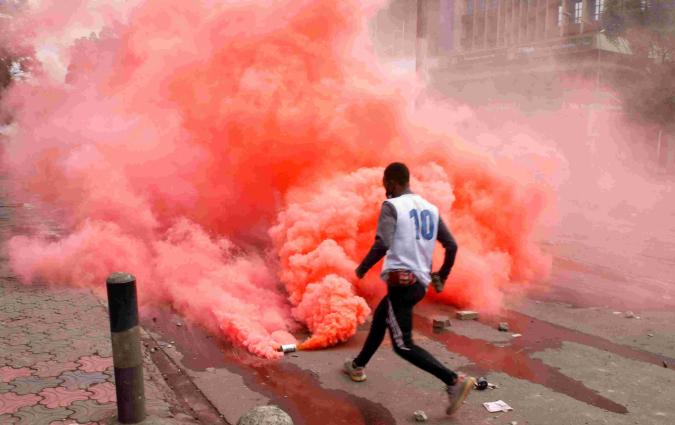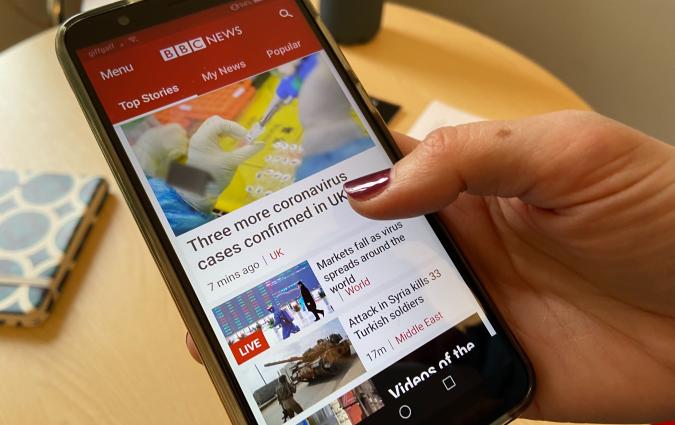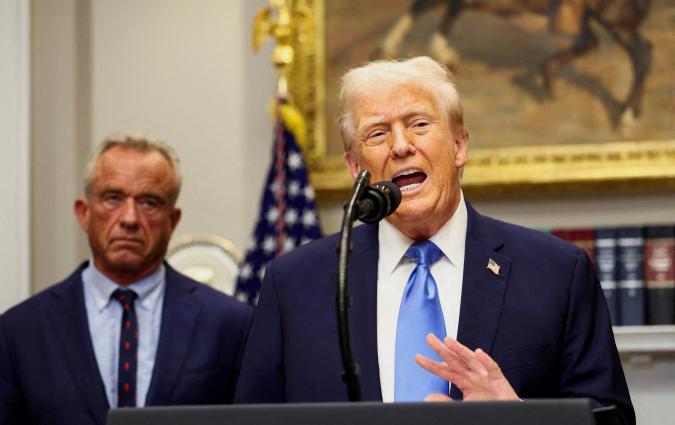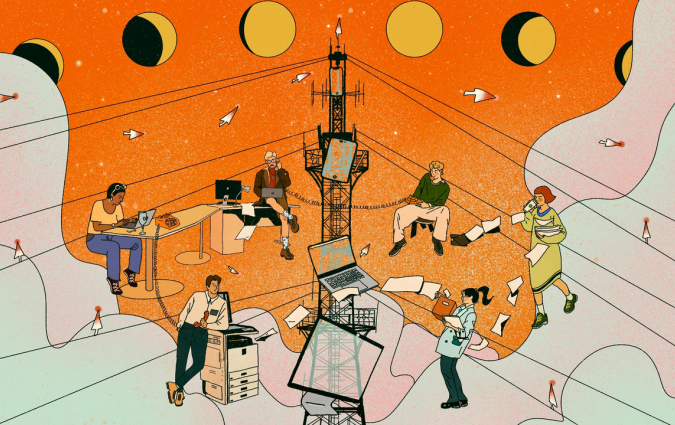Our podcast: How the BBC addresses the challenge of disinformation worldwide
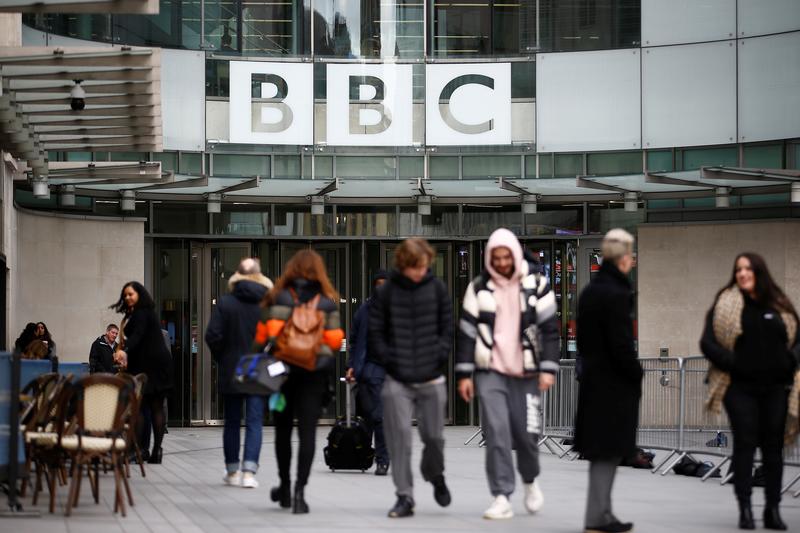
Pedestrians walk past BBC Broadcasting House in London REUTERS/Henry Nicholls
The topic
With the world-changing events of 2020 providing ample breeding grounds for the spread of disinformation, in this podcast we look at what one of the leading global broadcasters, the BBC, is doing to address this challenge. What responsibilities does the BBC have to debunk disinformation and when does it consider it wise or appropriate to do so? And should debunking exist outside of the BBC's main news providing service or be an integral part of it? These are some of the questions we raise in our discussion.
The guests
Our host is Meera Selva, Director of the Journalist Fellowship Programme. Our guest is Rebecca Skippage who established and leads the BBC's Disinformation Team and is an Editor with the BBC-wide Anti-Disinformation Unit. Rebecca is currently a Journalist Fellow at the Reuters Institute.
Listen to the podcast
Listen to the episode: On Apple Podcasts | On Spotify | On Google Podcasts
The transcript
On the evolution of news and disinformation monitoring ↑
Rebecca: BBC Monitoring started just over 80 years ago now, and was set up to listen into open source German radio propaganda at the beginning of the First World War. And over the last 80 years has listened to Russian radio broadcasts to TV that’s come from all over the world. And very much it’s used to plugging into what primarily then were state narratives about the messaging that was trying to be used to form the way that people thought. Sometimes at odds with the actual facts on the ground, shall we say?
And it was really felt that the BBC should be very much on the front foot as far as this was concerned, and that we should play a big part in combating that, in informing our viewers and our listeners and our readers about what it was, what it is, explaining how they can inform themselves to inoculate themselves against it to a certain extent.
And so Jamie Angus, who’s Head of the World Service Group, came to Monitoring, went to the then director and said, “You guys are the people who have been listening into this for the last 80 years, would you be interested in forming a disinformation team?” And we of course were absolutely delighted to do that.
And just over two years ago, I formed a team. We have specialists specifically in Russia and the wider FSU, in Iran and the Middle East, and in China and the Koreas. But what we have is this network also of 200+ journalists in our 13 bureaus around the world who are also listening into this sort of material on a day-to-day, minute-by-minute basis, and are able to really inform the sort of reporting that we’re doing.
On the difference between 'monitoring' and journalism ↑
Rebecca: 'Monitoring' actually is somewhat of a misnomer now because all of our journalists are journalists. There used to be monitors, it used to be a less journalistic endeavour. But certainly for the last, I would say, 10 years or so, the journalistic focus has been very clear at Monitoring.
There certainly is still a lot of simply listening and transcribing and putting reports out that simply explain what’s going on, but increasingly what we do is we analyse and we say, “This is the reason that this is important.” And we put out explainers and we put out things that not only go into what is being said but why it is being said and, crucially rather, what is not being said.
And I think the place that the disinformation unit plays is that it can take one step back even further from that and to start joining the dots and saying, “Okay, these are there sorts of narratives that keep coming through.” Or rather, sometimes this is a narrative that has now changed, and to take a step back and say, “What is it that is now trying to be achieved by that?”
And I think having this global reach, we’re able, and I would say probably uniquely, to join up the narratives across regions, so we can look at a situation like Syria which has got so many competing narratives that are going on, and say, “Okay, this is what the Turkish state media are saying; this is what the pro-government forces are saying” and try and create a more genuine picture of what’s happening, but at the same time explaining why these different narratives are fighting against each other.
On disinformation strategies around COVID-19 ↑
Rebecca: What was really fascinating was that as soon as COVID started, we started obviously getting rumours coming out of China from our traditional monitoring, if you will. And almost as soon as that happened, the disinformation virus, the infodemic, as people are categorising it, started alongside.
And what we’ve been able to see, and again, this is the great value of having a global perspective, is that almost the same stories, the same false narratives wave across the Earth, wave across the globe as the pandemic does. And some of them are reasonably innocuous, so we sort of raise our eyebrows as if, “Ah, yes, it’s the ‘let’s all drink lemon juice,’” bit of disinformation which pops up as soon as COVID appears in a various area.
But there are those pieces of disinformation of course that are much, much more concerning. Some of them are reasonably specific to country, so we’ve had in India lots of misinformation earlier in the year between how various different religious minority groups where the people who were spreading it.
And of course that sort of played into the political authorities wanting to raise up discontent amongst different people in that part of the world.
And he also saw, coming into Europe, this kind of amalgamation of anti-5G sentiment, then sort of rolling in the anti-vax notion, and that then became part of the anti-mask thing. So you've really got, and we see this a lot with disinformation, people who are procreating lots of different types of narratives, being very opportunistic about what is particularly of interest to people online at that point. And appropriating that and rolling that in into something that allows them to get their key concern across.
Then the other big daddy of everything, of anti-disinformation, which has also been rolled into COVID, has been QAnon, and that’s really been off the back of the anti-vaccine and the anti-mask sentiment that QAnon has managed to worm its way in there as well.
On when to challenge disinformation ↑
Rebecca: I think the biggest question we face is: when do we cover stories and when do we do not, particularly because we’re the BBC? We put something online and it amplifies it.
So the two things that we constantly look at as far as whether something is worth us covering are intent, is this something which is, as I say, pretty innocuous and is probably not really going to cause that much trouble? Or is there an intent for it to actually cause serious harm, a serious impact on the democratic process, serious injury to people.
And then we look, and this is probably the crucial bit, we look at impact. So how many people is this reaching? Is this jumping into other languages? Is this going across platform? Is this reaching hundreds of thousands of on, as I say, Facebook? Has it gone to TikTok? Has it reached not necessarily the sorts of people that you would expect something like an anti-5G conspiracy theory to reach? Has it jumped into the main stream, if you will?”
And I think particularly if we’re then seeing potential real world action that could come out of that, whether that be injecting yourself with bleach, whether that could be taking up arms, as we’re seeing. Just as we’re speaking now, there's a Stop the Steal group on Facebook that’s just been taken down which is encouraging, has been encouraging people to take direct action in the US election.
Whether it’s that sort of thing or setting to 5G masts that we saw over the summer, that’s the time that we have, we feel have a responsibility to put material out.
We have to be incredibly careful about being accurate in what we say. I mean obviously that is always, our goal is highest accuracy anyway, but there is nothing that undermines a piece on disinformation more than getting the information wrong. So that’s been really, really one of the key things is that we don’t want to publish too quickly, we want to make sure that we’ve got the information right, that we’ve got the debunks right, that we’ve got as many experts as possible. Then we get it out.
But I would say that at the moment, I’m, as you mention it, in Oxford but my colleagues working on the US election, I absolutely take my hat off to them because they're having to do this absolutely at pace, and I think they're doing a magnificent job.
On the role of media literacy ↑
Rebecca: Certainly the research that I’ve done at the moment and my experience of doing this is that I think there is probably a suite of options that we should be offering people. I mean, for me, critical thinking and media literacy are absolutely at the key of this.
It’s been interesting to talk to educators about how critical thinking seems not to be such a key part of the curriculum as it used to be, and I wonder whether there's anything around that that maybe an organisation like the BBC could look to provide some additional support around.
I think fact-checking is important. There is a school of thought that says if you say to somebody who passionately believes something they're wrong, that won’t have any impact on it. But I think that there is a great swathe of people who do get huge benefit from fact-checking, and it is something that news organisations should be doing.
However, as you say, it can completely take over what it is that you do. So one of the things that I’m looking at is how actually you can embed that into the wider, more “normal newsgathering” that you do, so it’s kind of part of what we do on a regular basis rather than being kind of siloed off into a separate bit of the newsroom.
My concern with anything that might be seen as something that is less mainstream is that if you make a separate department that just simply looks into one particular area, that it might be that people feel, “Oh well, we don't need to worry so much about that, they are looking into it.” Whereas my feeling is is that there should be absolutely as part of the DNA of a general reporting and general newsgathering and production system as we would be checking how somebody’s name is spelled.
And I think some of the skills that we have got within our team as far as verification, as far as debunking, as far as how we call these things out, I’d like to see them more embedded into the general newsgathering, and that’s something that I’m going to be looking at as part of my project.
On audiences' reaction to the BBC's anti-disinformation work ↑
Rebecca: I think that’s one of the balancing acts that we had to deal with, nobody likes to feel that they're being lectured at. I think we have a really talented bunch, certainly within the team that I’m part of, of people who know how to explain and communicate in a way that is much more appetising. We have a wonderful reporter called Marianna Spring who has done some really great work on a social media platform saying, “This is how you can look out for it yourself.”
But there is a real void as far as people’s sense of what is right and what is wrong at the moment. I mean, if you just looked at this very minute on this story that is top of the BBC News site, and it’s the reality check done into the 70-minute speech that Donald Trump gave on Thursday about false claims to do generally to do with mail-in ballots. So I think people are aware that their political leaders are not perhaps as straightforward as once they hoped they were. And there is a desire to be able to come to an organisation that they still do trust and see what it is that’s really true.


